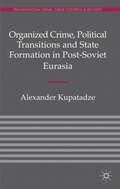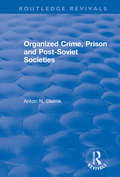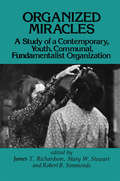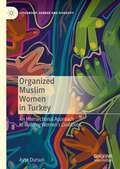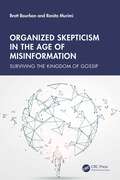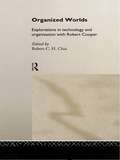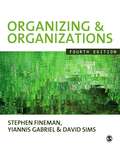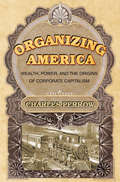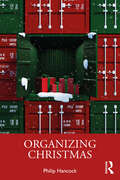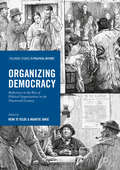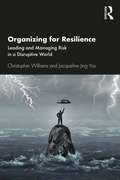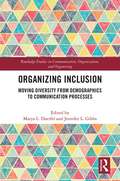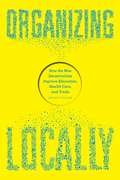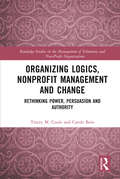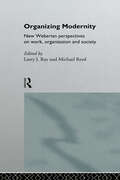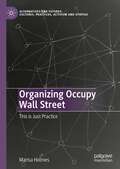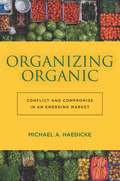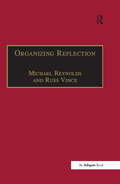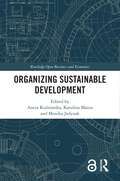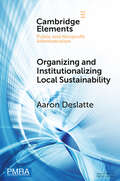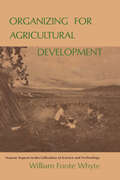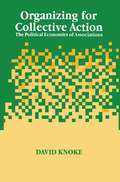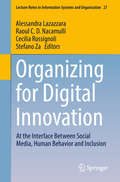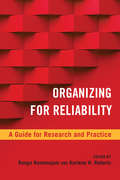- Table View
- List View
Organized Crime, Political Transitions and State Formation in Post-Soviet Eurasia
by Alexander KupatadzeFor thisinnovative study, the first situating organized crime in the debate on state formation, Alexander Kupatadze interviewed over one hundred respondents including criminals, law enforcement officials, and politicians in post-Soviet Georgia, Ukraine and Kyrgyzstan to map the divergent patterns of organized crime in these countries following their Coloured Revolutions. Drawing upon unique case studies of criminal activity, the authortraces the thin line dividing the licit and illicit spheres, or 'upper' and 'under' economic and political worlds. Kupatadze argues that state formation in post-Soviet Eurasia has been heavily marked by struggle for the dominance between political elites and organized crime groups that involved various forms of contention and collaboration. In reassessing the nature of state criminalization, Kupatadze introduces three dimensions of the state that determine the patterns of dominance: political-coercive, economic-taxation and ideological-informational. He distills the variables surrounding organized crime into contextual (geography, regional wars) and intermediate (related with the Coloured Revolutions such as participation of civil society, resources of competing political groups). This work is an important contribution to the study of organized criminality and state formation.
Organized Crime, Prison and Post-Soviet Societies
by Anton Oleinik Alain TouraineThis title was first published in 2003. The "Red Mafia" in Russia have become the subject of increasing international interest and considerable misinterpretation. After well-received editions in Russian, French and Italian, Anton Oleinik's study of Russian prisons, in which he explores the social roots of organized crime in post-Soviet societies, is now published in English. This English edition includes a postscript on the Moscow terrorist crisis of 2002. Oleinik's analysis reveals prison society as a mirror of broader Russian society - characterized by the absence of the state as an organizer of social practices. He builds on this to make a central distinction between two types of societies - the modern "large" society and the "small" society, like Russia, that has only been partially modernized, and in which the world of everyday life, experiences and relationships remains entirely separated from the official aims of modernization and efficiency. Oleinik is interested in the void between these two separate worlds, a void he sees being filled in Russia by the Mafia.
Organized Miracles: Study of a Contemporary Youth Communal Fundamentalist Organization
by James T. Richardson"Excellent study which moves back and forth between theory and empirical observations. It looks at religious groups from several different theoretical positions as well as raises a number of significant issues about the conduct of eld research."--Russell R. Dynes, American Sociological Association
Organized Muslim Women in Turkey: An Intersectional Approach to Building Women’s Coalitions (Citizenship, Gender and Diversity)
by Ayşe DursunThis book explores the politics of organized Muslim women in Turkey and analyzes their coalitions with other—secular feminist, Kurdish, etc.—women’s movements from an intersectional perspective. It provides empirical evidence for significant changes in Muslim women’s politics under the ruling Justice and Development Party (AKP) and points to the increasing difficulty to build cross-movement women’s coalitions in the face of rising religious-conservatism and authoritarianism under the AKP rule. While feminist Muslim women who display an intersectional understanding of structural inequality and oppression are found to be more resilient in the face of political pressure, conservative Muslim women dodge women’s coalitions and align with the government’s discourses and policies. Empirical evidence based on interviews with organized Muslim women also shows that prospects for coalition building largely depends on the specific societal and institutional (re-)configurations of patriarchy along with other relations of domination rather than mere ideological “difference” among women. This book will be of interest to scholars and students across Gender Studies, Sociology, and Political Science, particularly those whose research focuses on intersectionality and social movements.
Organized Skepticism in the Age of Misinformation: Surviving the Kingdom of Gossip
by Brett Bourbon Renita MurimiDrawing from philosophy, information theory, and network science, Organized Skepticism in the Age of Misinformation: Surviving the Kingdom of Gossip offers a novel conceptual framework that views information as a form of gossip.This book challenges the idea that truthfulness is a necessary, or even a relevant condition, of information. Instead, this book develops a conceptual framework in which information is understood as gossip, which fits within a more general account of information and knowledge as constrained but contingent social practices. Using this framework, this book provides a nuanced understanding of the “grammar” of gossip that permeates both online and real‑orld environments and sheds light on the often overused and confused terms of our time: information, misinformation and knowledge.This book offers a fundamental reconfiguration of the evolving virtual interdependence of humans and information technology. It is a key resource for students and scholars in areas relating to social media, information diffusion, human/computer interface, and computational social science.
Organized Worlds: Explorations in Technology and Organization with Robert Cooper
by Robert C.H. ChiaOrganized Worlds locates the study of organization within the wider area of social theory. It explores in detail the intricate relationships that exist between technology, representation and organization. The collection includes a chapter from the leading expert in the field, Robert Cooper, as well as an interview with him. Other contributors build upon and extend the findings of Cooper.This is a companion volume to In the Realm of Organization.
Organizing & Organizations: An Introduction
by Stephen FinemanOrganizing and Organizations is well loved by students and lecturers for its accessible, conversational tone and insightful real-life examples introducing the study of organizations and organizational behaviour. Fineman, Gabriel and Sims, eminent academics in the field, cover a wealth of key concepts, research and literature leaving students informed and engaged. The Fourth Edition builds on the strengths of previous editions, to provide you with a textbook that continues to stand out from the rest. This new edition has been fully developed to include: - New chapters on Influence and Power, and Innovation and Change. - A new section within each chapter that highlights the theoretical links informing the chapters. - New review questions to test and apply your understanding of the ideas in each chapter. - New 'reading on' sections that direct you to free links to highly recommended journal articles relating to each chapter's coverage, and found on the companion website. - New critical review questions at the end of each chapter to encourage debate. - Each chapter is now enlivened with pictorial illustrations. - A fully updated glossary of key concepts in the study of organizations Organizing and Organizations integrates a strong critical approach throughout.
Organizing America: Wealth, Power, and the Origins of Corporate Capitalism
by Charles PerrowAmerican society today is shaped not nearly as much by vast open spaces as it is by vast, bureaucratic organizations. Over half the working population toils away at enterprises with 500 or more employees--up from zero percent in 1800. Is this institutional immensity the logical outcome of technological forces in an all-efficient market, as some have argued? In this book, the first organizational history of nineteenth-century America, Yale sociologist Charles Perrow says no. He shows that there was nothing inevitable about the surge in corporate size and power by century's end. Critics railed against the nationalizing of the economy, against corporations' monopoly powers, political subversion, environmental destruction, and "wage slavery." How did a nation committed to individual freedom, family firms, public goods, and decentralized power become transformed in one century? Bountiful resources, a mass market, and the industrial revolution gave entrepreneurs broad scope. In Europe, the state and the church kept private organizations small and required consideration of the public good. In America, the courts and business-steeped legislators removed regulatory constraints over the century, centralizing industry and privatizing the railroads. Despite resistance, the corporate form became the model for the next century. Bureaucratic structure spread to government and the nonprofits. Writing in the tradition of Max Weber, Perrow concludes that the driving force of our history is not technology, politics, or culture, but large, bureaucratic organizations. Perrow, the author of award-winning books on organizations, employs his witty, trenchant, and graceful style here to maximum effect. Colorful vignettes abound: today's headlines echo past battles for unchecked organizational freedom; socially responsible alternatives that were tried are explored along with the historical contingencies that sent us down one road rather than another. No other book takes the role of organizations in America's development as seriously. The resultant insights presage a new historical genre.
Organizing Christmas
by Philip HancockOrganizing Christmas is an exploration of the organizational character of Christmas. Taking as its starting point the view that Christmas initially achieved popularity due to its potential to promote social cohesion and political stability, this book both charts and scrutinizes its global emergence as the year's preeminent economic and organizational event. Combining historical narrative, original interviews, and social scientific research and theories, it tells the story of how Christmas has come to dominate the festival landscape and how it emerged as an integral component of the global evolution of contemporary social and economic relations. From the pre-Christian celebrations and politics of the turning of the calendar year, through the power games of Elizabethan England and the wily reinvention of the season by industrious Victorians, to today’s huge economic and logistical exercise that relies on everything from global supply chains to the domestic division of labour, Organizing Christmas demonstrates how the season exemplifies the spirit and practices of industrial, and now post-industrial, modernity. As well as documenting this fact, however, Organizing Christmas also critically interrogates what has become a vast festive-industrial complex. From low-paid factory workers in Yiwu to Santa Claus performers in Kingston, readers are given a chance to consider what the cost of this global festival might be and whether it is a price worth paying. Drawing on intellectual resources ranging from Adorno and Horkheimer’s classic critique of the culture industry, thorough Böhme’s analysis of the sociomaterial production of atmospheres, to Bloch’s ‘principle of hope’, it paints a picture of Christmas as a profoundly important, if deeply contested historical, cultural and, most significantly, organizational phenomenon. Aimed at students and academics in Organization Studies, Cultural Studies, and the Sociology of Work and Employment, as well as the general reader interested in the festive season, Organizing Christmas offers a differing perspective on a subject so familiar and yet so often overlooked.
Organizing Democracy
by Maartje Janse Henk Te VeldeThis book explores the new types of political organization that emerged in Western Europe and the United States during the nineteenth century, from popular meetings to single-issue organizations and political parties. The development of these has often been used to demonstrate a movement towards democratic representation or political institutionalization. This volume challenges the idea that the development of 'democracy' is a story of rise and progress at all. It is rather a story of continuous but never completely satisfying attempts of interpreting the rule of the people. Taking the perspective of nineteenth-century organizers as its point of departure, this study shows that contemporaries hardly distinguished between petitioning, meeting and association. The attraction of organizing was that it promised representation, accountability and popular participation. Only in the twentieth century did parties reliable partners for the state in averting revolution, managing the unpredictable effects of universal suffrage, and reforming society. This collection analyzes them in their earliest stage, as just one of several types of civil society organizations, that did not differ that much from each other. The promise of organization, and the experiments that resulted from it, deeply impacted modern politics.
Organizing For Resilience: Leading and Managing Risk in a Disruptive World
by Christopher Williams Jacqueline Jing YouOrganizing for Resilience provides a fresh and novel insight into research on how leaders can prepare their organizations to face up to shocks and disruptions in a turbulent and unpredictable world. It provides an analysis of the topic of organizational resilience in a comprehensive and integrative way, with fresh theoretical and research implications as well as important implications for leaders.The first book to synthesize themes from across a spectrum of resilience using the metaphor of a ‘resilience landscape’, chapters in Part I are devoted to five analytical levels: individual level resilience; small firms in which major disruption can threaten survival; large firms with disruptions in one part of the organization; large firms facing enterprise-wide disruption; and disruption to a complete community or economic ecosystem of individuals and organizations. Cases and practice insights are presented to bring the topics to life, allowing reflection and debate at each level. In Part II, the construct of the ‘resilience landscape’ is developed, along with a discussion on leadership for resilience by instilling a resilience mind-set and developing capabilities in relational resilience.The book is ideally suited to bachelor’s and master’s degree courses on strategy, organizational behaviour and leadership. PhD and DBA researchers in the field of resilience and strategy will also find the book useful, as will practising consultants and business leaders.
Organizing Inclusion: Moving Diversity from Demographics to Communication Processes (Routledge Studies in Communication, Organization, and Organizing)
by Marya L. Doerfel Jennifer L. GibbsOrganizing Inclusion brings communication experts together to examine issues of inclusion and exclusion, which have emerged as a major challenge as both society and the workforce become more diverse. Connecting communication theories to diversity and inclusion, and clarifying that inclusion is about the communication processes of organizations, institutions, and communities, the book explores how communication as an organizing phenomenon underlies systemic and institutionalized biases and generates practices that privilege certain groups while excluding or marginalizing others. Bringing a global perspective that transcends particular problems faced by Western cultures, the contributors address issues across sub-disciplines of communication studies, ranging from social and environmental activism to problems of race, gender, sexual orientation, age and ability. With these various perspectives, the chapters go beyond demographic diversity by addressing interaction and structural processes that can be used to promote inclusion. Using these multiple theoretical frameworks, Organizing Inclusion is an intellectual resource for improving theoretical understanding and practical applications that come with ever more diverse people working, coordinating, and engaging one another. The book will be of great relevance to organizational stakeholders, human resource personnel and policy makers, as well as to scholars and students working in the fields of communication, management, and organization studies.
Organizing Locally: How the New Decentralists Improve Education, Health Care, and Trade
by Bruce FullerWe love the local. From the cherries we buy, to the grocer who sells them, to the school where our child unpacks them for lunch, we express resurgent faith in decentralizing the institutions and businesses that arrange our daily lives. But the fact is that huge, bureaucratic organizations often still shape the character of our jobs, schools, the groceries where we shop, and even the hospitals we entrust with our lives. So how, exactly, can we work small, when everything around us is so big, so global and standardized? In Organizing Locally, Bruce Fuller shows us, taking stock of America's rekindled commitment to localism across an illuminating range of sectors, unearthing the crucial values and practices of decentralized firms that work. Fuller first untangles the economic and cultural currents that have eroded the efficacy of--and our trust in--large institutions over the past half century. From there we meet intrepid leaders who have been doing things differently. Traveling from a charter school in San Francisco to a veterans service network in Iowa, from a Pennsylvania health-care firm to the Manhattan branch of a Swedish bank, he explores how creative managers have turned local staff loose to craft inventive practices, untethered from central rules and plain-vanilla routines. By holding their successes and failures up to the same analytical light, he vividly reveals the key cornerstones of social organization on which motivating and effective decentralization depends. Ultimately, he brings order and evidence to the often strident debates about who has the power--and on what scale--to structure how we work and live locally. Written for managers, policy makers, and reform activists, Organizing Locally details the profound decentering of work and life inside firms, unfolding across postindustrial societies. Its fresh theoretical framework explains resurging faith in decentralized organizations and the ingredients that deliver vibrant meaning and efficacy for residents inside. Ultimately, it is a synthesizing study, a courageous and radical new way of conceiving of American vitality, creativity, and ambition.
Organizing Logics, Nonprofit Management and Change: Rethinking Power, Persuasion and Authority (Routledge Studies in the Management of Voluntary and Non-Profit Organizations)
by Tracey M. Coule Carole BainNonprofit organizations are conventionally positioned as generators of social and cultural forms of capital for the common good. As such they occupy a different space to other types of organizations such as corporate firms that exist primarily to generate economic capital for private owners/shareholders. Recent years, however, have seen professionalization promoted widely by funders, policy-makers and nonprofit practitioners across the globe. At the same time, there has been an increasing cross-over of employees from private and public bodies into nonprofits. But do such shifts open up space for the wholesale importation of managerialism into and commercialization of the nonprofit sphere? Are nonprofits at risk of being reconstituted as primarily economic entities, serving the interests of a leadership elite? How are such changes in an organization’s trajectory brought about? What are the consequences for trustees, staff, members and the nature of managerial work? The authors engage with critical questions such as these through a unique insider account of one professional institute experiencing unprecedented changes that challenge its very reason for being. Drawing on a three-year ethnography, they narrate organizational inhabitants’ struggles in their search for purpose and analyze the myriad of changes within different aspects of organizing including structure, strategizing, pay and reward, governance and leadership. The book will enable readers to reframe and rethink organizational change as a process involving power, persuasion and authority, and will be of value to researchers, students, academics and practitioners interested in managerial work and organizational change in non-profit organizations.
Organizing Modernity: New Weberian Perspectives on Work, Organization and Society
by Michael Reed Larry RayThis book provides a reassessment of the significance of Max Weber's work for the current debates about the institutional and organizational dynamics of modernity. It re-evaluates Weber's sociology of bureaucracy and his general account of the trajectory of modernity with reference to the strategic social structures that dominated the emergence and development of modern society. Included here are detailed analyses of contemporary issues such as the collapse of communism, fordism, coporatism and traditionalism in both Western and Eastern societies. All of the contributors are scholars of international repute. They undertake analyses of Weber's texts and his broader intellectual inheritance to reassert the centrality of Weberian sociology for our understanding of the moral, political and organizational dilemmas of late modernity. These analyses challenge orthodox readings of Weber as the prophet of the iron cage. Instead they offer interpretations of his work which emphasize the reality of modernity as a dual process with the potential for both disarticulation of rational structures and deeper colonization of daily life. Not only is this book essential reading for Weber specialists but it also provides compelling analyses of modernity and the inherently contingent nature of global cultural and stuctural transformation. Martin Albrow, Roehampton Institute; Stewart Clegg, University of Western Sydney; David Chalcraft, Oxford Brookes University; John Eldridge, Glasgow University; Larry J
Organizing Occupy Wall Street: This is Just Practice (Alternatives and Futures: Cultures, Practices, Activism and Utopias)
by Marisa HolmesThis book is the first study of the processes and structures of the Occupy Wall Street movement, written from the perspective of a core organizer who was involved from the inception to the end. While much has been written on OWS, few books have focused on how the movement was organized. Marisa Holmes, an organizer of OWS in New York City, aims to fill this gap by deriving the theory from the practice and analyzing a broad range of original primary sources, from collective statements, structure documents, meeting minutes, and live tweets, to hundreds of hours of footage from the OWS Media Working Group archive. In doing so, she reveals how the movement was organized in practice, which experiments were most successful, and what future generations can learn.
Organizing Organic: Conflict and Compromise in an Emerging Market
by Michael HaedickeStakeholders in the organic food movement agree that it has the potential to transform our food system, and yet there is little consensus about what this transformation should look like. Tracing the history of the organic food sector, Michael A. Haedicke charts the development of two narratives that do more than simply polarize the organic debate, they give way to competing institutional logics. On the one hand, social activists contend that organics can break up the concentration of power that rests in the hands of a big, traditional agribusiness. Alternatively, professionals who are steeped in the culture of business emphasize the potential for market growth, for fostering better behemoths. Independent food store owners are then left to reconcile these ideas as they construct their professional identities and hone their business strategies. Drawing on extensive interviews and unique archival sources, Haedicke looks at how these groups make sense of their everyday work. He pays particular attention to instances in which individuals overcome the conflicting narratives of industry transformation and market expansion by creating new cultural concepts and organizational forms. At once an account of the sector's development and an analysis of individual choices within it, Organizing Organic provides a nuanced account of the way the organic movement continues to negotiate ethical values and economic productivity.
Organizing Reflection
by Michael ReynoldsThrough a series of leading-edge contributions from pre-eminent international scholars in the field, Organizing Reflection makes a stimulating and distinctive contribution to the study of reflection. By doing so, it offers the first shift from the individual reflective practitioner to processes of collective and public reflection. The unique and varied contributions focus on the development of notions such as public reflection, collective reflection, and critical reflection. In doing so, they provide critical insights into new thinking and approaches to the role of reflection in organizations, as well as the conceptualization and delivery of learning and change. Organizing Reflection will be of interest to scholars working in business, professional, management and organization studies, to human development academics, and to scholarly practitioners in organizations.
Organizing Sustainable Development (Routledge Open Business and Economics)
by Aneta Kuźniarska Karolina Mania Monika JedynakThe role and meaning of sustainable development have been recognized in the scientific literature for decades. However, there has recently been a dynamic increase in interest in the subject, which results in numerous, in-depth scientific research and publications with an interdisciplinary dimension. This edited volume is a compendium of theoretical knowledge on sustainable development. The context analysed in the publication includes a multi-level and multi-aspect analysis starting from the historical and legal conditions, through elements of the macro level and the micro level, inside the organization. Organizing Sustainable Development offers a systematic and comprehensive theoretical analysis of sustainable development supplemented with practical examples, which will allow obtaining comprehensive knowledge about the meaning and its multi-context application in practice. It shows the latest state of knowledge on the topic and will be of interest to students at an advanced level, academics and reflective practitioners in the fields of sustainable development, management studies, organizational studies and corporate social responsibility.
Organizing and Institutionalizing Local Sustainability: A Design Approach (Elements in Public and Nonprofit Administration)
by Aaron DeslatteThis Element explores the role of public managers as designers. Drawing from systems-thinking and strategic management, a process-tracing methodology is used to examine three design processes whereby public managers develop strategies for adapting to climate change, build the requisite capabilities and evaluate outcomes. Across three cases, the findings highlight the role of managers as 'design- oriented' integration agents and point to areas where additional inquiry is warranted. This title is also available as Open Access on Cambridge Core.
Organizing for Agricultural Development: Human Aspects in the Utilization of Science and Technology
by William Foote WhyteThere is increasing recognition, even among hard-nosed agricultural scientists, that progress in technology and in the scientific fields directly related to the growth of plants is necessary but not sufficient to produce major social and economic benefits. Agricultural scientists are therefore turning to behavioral scientists for advice and collaboration; they must search together for the solutions to problems of food shortages and rural development. Through an analysis of the procedures of agricultural extension agents, organizational frameworks. divisions of labor and social structures, William Foote Whyte proposes a reformulation of social theory that does not abandon humanistic values but requires us to examine the conditions and agencies for realization of these values by concentration upon the structural elements influencing behavior in agrarian societies. Only then can technological and agricultural innovations be introduced to rural areas with success.
Organizing for Collective Action: The Political Economies of Associations (Social Institutions And Social Change Ser.)
by David KnokeOrganizing for Collective Action investigates the political and economic behaviors of national associations, including trade associations, professional societies, labor unions, and public interest groups. It focuses upon the ways that these organizations acquire resources and allocate them to various collective actions, particularly for member services, public relations, and political action. This analysis is structured around three broad theoretical paradigms for collective action: (1) the problem of societal integration which concerns the ways that people are tied to organizations and the ways that organizations connect their members with the larger society; (2) the problem of organizational governance which considers how individuals become unified collectivities capable of acting in a coordinated manner, and (3) the problem of public policy influence which involves interactions among public and private interest groups to formulate the binding decisions under which we all must live.
Organizing for Digital Innovation: At the Interface Between Social Media, Human Behavior and Inclusion (Lecture Notes in Information Systems and Organisation #27)
by Cecilia Rossignoli Stefano Za Alessandra Lazazzara Raoul C.D. NacamulliThis book presents a collection of research papers exploring the human side of digital innovation management, with a specific focus on what people say and share on social media, how they respond to the introduction of specific IT tools, and how digital innovations are impacting sustainability and inclusion. Given the plurality of views that it offers, the book is particularly relevant for digital technology users, companies, scientists and governments. The overall spread of digital and technological advances is enhanced or hampered by people’s skills, behaviors and attitudes. The challenge of balancing the digital dimension with humans situated in specific contexts, relations and networks has sparked a growing interest in how people use and respond to digital innovations. The content of the book is based on a selection of the best papers – original double-blind peer-reviewed contributions – presented at the annual conference of the Italian chapter of the AIS, which was held in Milan, Italy, in October 2017.
Organizing for Reliability: A Guide For Research And Practice (High Reliability And Crisis Management Ser.)
by Ranga Ramanujam Karlene H. RobertsIncreasingly, scholars view reliability—the ability to plan for and withstand disaster—as a social construction. However, there is a tendency to evoke this concept only in the face of catastrophes, such as the British Petroleum oil spill or the Space Shuttle Challenger explosion. This book frames reliability as a fundamental issue in the study of organizations—one that can also improve day-to-day operations. Bringing together a diverse cast of contributors, it considers how we can account for the ability of some organizations to maintain high reliability and what we can learn from them. The chapters distinguish reliability from related lines of inquiry; take stock of relevant research from different disciplinary perspectives; highlight implications for practice; and identify directions, questions, and priorities for future research. The first of its kind in over twenty years, this volume delivers a dynamic base of shared knowledge and an integrative research agenda at a time when organizational reliability has never been so important.
Organizing for Social Change (Fourth Edition)
by Jackie Kendall Kim Bobo Steve MaxNow in its fourth edition, here is the comprehensive manual for grassroots organizers working for social, racial, environmental and economic justice at the local, state and national levels. Since 1973 the Midwest Academy has trained more than 30,000 activists in progressive organizations, unions, and faith-based groups.
